罗哌卡因复合布托啡诺腹横肌平面阻滞对妇科腹腔镜患者术后镇痛及早期康复的影响
腹横肌平面阻滞复合全身麻醉对妇科腹腔镜手术患者术后早期恢复和

• 74•中国实用医刊 2019 年 8 月第 46 卷第16 期Chinese Journal of Practical Medicine,Aug. 2019,Vol. 46,No. 16于对照组,差异有统计学意义(p<〇.05),上述结果提 示微创手术更有助于提升患者的关节功能,改善患者 的预后质量,提升患者的满意度。
对于常规治疗,微创手术可更加直观地观测到创 伤部位的具体情况,手术过程中能够更加清晰地对创 伤部位进行处理,并且不易损伤周围组织,对损伤部位 周围血运影响较小,并且术后未见分泌物连接情况,对 全面提升手术质量具有重要意义。
但本研究也存在一 定局限性,由于本研究人组患者相对较少,实验结果的 有效性仍有待在今后进一步确证,笔者将在今后扩大 研究规模,进行进一步探讨。
综上所述,微创手术在创伤骨科疾病治疗中发挥 着重大作用,不仅有助于缩短手术治疗时间,还有助于 降低相关并发症的发生率,进而提升患者的关节优良 率,提升患者的整体预后质量,值得临床应用和推广。
参考文献[1] Sham s A, E l-S ayed M , Elsaw y M, e t a l. C o m p arativ e, pro sp ectiv e,random ized study o f th e m odified m inim ally invasive te c h n iq u e versu sth e co n v en tio n al te c h n iq u e o f dynam ic h ip screw( D H S) , fixation forin te rtro ch a n te ric fractu res in the elderly [ J ].E u r O rthopaed T rau m a-to l, 2015, 6(1):27-33. D O I:10. 1007/s l2570-014-0267-X.[2]孙禹.微创技术在140例骨科创伤患者临床治疗中的应用分析[J]•中国现代药物应用,2018, 12(1):4748.D O丨:10. 14164/j. c n k i. c n l 1-5581/r. 2018.01.027.[3]谷茂.分析研究微创手术治疗脊柱创伤的临床疗效[J].中国伤残医学,2017, 25 (20): 35-36. D01: 10. 13214/j. c n k i. cjotadm.2017.20.018.[4]方晶晶.损伤控制外科技术在骨科下肢创伤急救中的应用效果[J].中国实用医刊,2017, 44(4):57-59.D01:10.3760/c m a.j. issn. 16744756.2017.04.018.[5]王毅.探讨关节镜微创技术在膝关节骨创伤的临床效果[J].中国伤残医学,2017, 25(15 ):4446.D0I: 10. 13214/j. c n k i. cjotadm. 2017. 15.026.(收稿日期:2019-05-27)(本文编辑:刘小敏)腹横肌平面阻滞复合全身麻醉对妇科腹腔镜手术患者术后早期恢复和镇痛的影响陈文李长科张强粤北人民医院麻醉科,广东韶关512026通信作者:李长科,E m a il: w oydyz@163 •com【摘要】目的探讨妇科腹腔镜手术患者联合应用全身麻醉、腹横肌平面阻滞对其术后早期恢复、镇痛影响 的价值。
酒石酸布托啡诺复合罗哌卡因双侧腹横肌平面阻滞及腹直肌鞘阻滞对腹腔镜胆囊切除术术后疼痛控制效果的比较
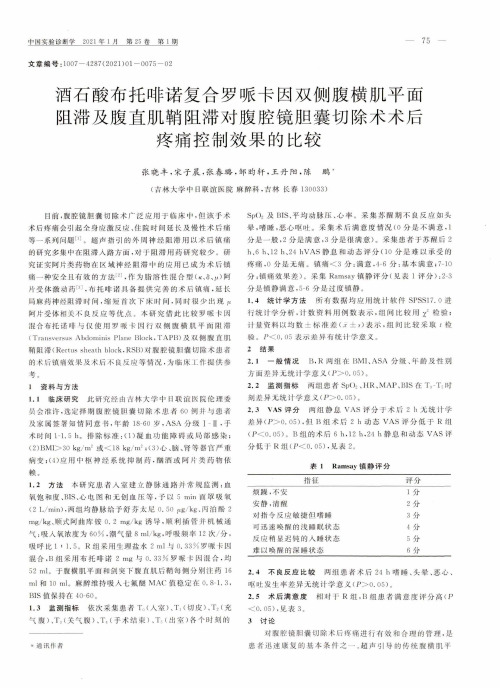
中国实验诊断学 2021年1月第25卷第1期75文章编号:1007— 4287(2021)01— 0075—02酒石酸布托啡诺复合罗哌卡因双侧腹横肌平面阻滞及腹直肌鞘阻滞对腹腔镜胆囊切除术术后疼痛控制效果的比较张晓丰,宋子晨,张春璐,邹昀轩,王丹阳,陈鹏*(吉林大学中日联谊医院麻醉科,吉林长春130033)目前.腹腔镜胆囊切除术广泛应用于临床中,但该手术术后疼痛会引起全身应激反应、住院时间延长及慢性术后痛等一系列问题[1]。
超声指引的外周神经阻滞用以术后镇痛的研究多集中在阻滞人路方面,对于阻滞用药研究较少。
研究证实阿片类药物在区域神经阻滞中的应用已成为术后镇痛一种安全且有效的方法[2],作为脂溶性混合型(k、S、f)阿片受体激动药™,布托啡诺具备提供完善的术后镇痛,延长局麻药神经阻滞时间,缩短首次下床时间,同时很少出现(i 阿片受体相关不良反应等优点。
本研究借此比较罗哌卡因混合布托诺啡与仅使用罗哌卡因行双侧腹横肌平面阻滞(T r a n s v e r s u s A b d o m i n i s P l a n e B l o c k,T A P B)及双侧腹直肌鞘阻滞(R e c t u s sh e a t h b l o c k.R S B)对腹腔镜胆囊切除术患者的术后镇痛效果及术后不良反应等情况,为临床工作提供参考。
1资料与方法1.1临床研究此研究经由吉林大学中日联谊医院伦理委员会准许,选定择期腹腔镜胆囊切除术患者60例并与患者及家属签署知情同意书.年龄18-60岁,A S A分级I-II ,手术时间1-1.5 h。
排除标准:(〗)凝血功能障碍或局部感染;(2)B M I>30 k g/m2或<18 k g/m2;(3)心、脑、肾等器官严重病变;(4)应用中枢神经系统抑制药.酗酒或阿片类药物依赖。
1.2方法本研究患者人室建立静脉通路并常规监测:血氧饱和度、B I S、心电图和无创血压等,予以 5 m i n面罩吸氧(2 L/m i n),两组均静脉给予舒芬太尼0• 50捭/k g、丙泊酚2 m g/k g、顺式阿曲库铵0. 2 m g/k g诱导,顺利插管并机械通气:吸人氧浓度为60%,潮气量8 m l/k g.呼吸频率12次/分,吸呼比1 :1.5。
罗哌卡因复合芬太尼腹横肌平面阻滞对剖宫产产妇术后疼痛、血流动力学及泌乳功能的影响
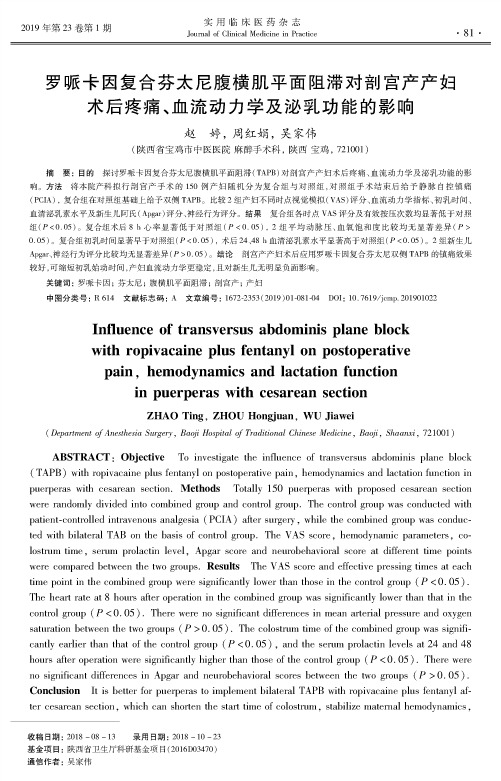
2019年第23卷第1期实用临床医药杂志Journal of Clinical Medicine in Practice• 81 •罗哌卡因复合芬太尼腹横肌平面阻滞对剖宫产产妇术后疼痛、血流动力学及泌乳功能的影响赵婷,周红娟,吴家伟(陕西省宝鸡市中医医院麻醉手术科,陕西宝鸡,721001)摘要:目的探讨罗哌卡因复合芬太尼腹横肌平面阻滞(TA P B)对剖宫产产妇术后疼痛、血流动力学及泌乳功能的影响。
方法将本院产科拟行剖宫产手术的10例产妇随机分为复合组与对照组,对照组手术结束后给予静脉自控镇痛(P C IA),复合组在对照组基础上给予双侧TA PB。
比较2组产妇不同时点视觉模拟(VAS)评分、血流动力学指标、初乳时间、血清泌乳素水平及新生儿阿氏(A p gar)评分、神经行为评分。
结果复合组各时点VAS评分及有效按压次数均显著低于对照组(P<0.05)。
复合组术后8h心率显著低于对照组<0.05),2组平均动脉压、血氧饱和度比较均无显著差异(P>〇.〇5)。
复合组初乳时间显著早于对照组(P<0.05),术后24、8h血清泌乳素水平显著高于对照组(P<0.05)。
2组新生儿A p g a r、神经行为评分比较均无显著差异(P>0.05)。
结论剖宫产产妇术后应用罗哌卡因复合芬太尼双侧TAPB的镇痛效果较好,可缩短初乳始动时间,产妇血流动力学更稳定,且对新生儿无明显负面影响。
关键词:罗哌卡因;芬太尼;腹横肌平面阻滞;剖宫产;产妇中图分类号:R614 文献标志码:A文章编号:1672-2353(2019)01-081-04D O I: 10.7619/jcm p.201901022Influence of transversus abdominis plane blockwitli ropivacaine plus fentanyl on postoperativepain,hemodynamics and lactation functionin puerperas with cesarean sectionZHAO Ting,ZHOU Hongjuan,WU Jiawei(Department of A nesthesia Surgery,Baoji Hospital of Traditional Chinese Medicine,Baoji,Shaanxi,721001)ABSTRACT:Objective To investigate the influence of transversus abdominis plane block (TAPB)with ropivacaine plus fentanyl on postoperative pain,hemodynamics and lactation function in puerperas with cesarean section.Methods Totally 150 puerperas with proposed cesarean sectionwere randomly divided into combined group and control group.The control group patient-controlled intravenous analgesia (PCIA)after surgery,while the combined group was conducted with bilateral TAB on the basis of control group.The VAS score,hemodyna lostrum time,serum prolactin level,Apgar score and neurobehavioral score at different time pointswere compared between the two groups.Results The VAS score and effective press time point in the combined group were significantly lower than those in the control group (P< 0. 05 ).The heart rate at8 hours after operation in the combined group was significantly lower than that in the control group (P< 0.05 ).There were no significant differences in mean arterial pressure and oxygen saturation between the two groups(P>0. 05) .The colostrum time of the combined group was significantly earlier than that of the control group(P<0. 05) ,and the serum prolactin levels at24 and48 hours after operation were significantly higher than those of the control group (P< 0. 05 ).There wereno significant differences in Apgar and neurobehavioral scores between the two group Conclusion It is better for puerperas to implement bilateral TAPB with ropivacaine plus fentanyl after cesarean section,which can shorten the start time of colostrum,stabilize maternal hemodynamics,收稿日期:2018-08 -13 录用日期:2018-10-23基金项目:陕西省卫生厅科研基金项目(2016D03470)通信作者:吴家伟• 82 •实用临床医药杂志第23卷and cause less negative impact for neonates.K E Y W ORDS:ropivacaine;fentanyl;transversus abdominis plane block;cesarean section;puerperas剖宫产术的术后疼痛主要来自腹壁切口痛和 子宫收缩痛,不仅影响产妇术后早期恢复,还对母 乳喂养存在一定影响[1]。
罗哌卡因腹横肌平面阻滞对妇科腹腔镜手术的镇痛效果
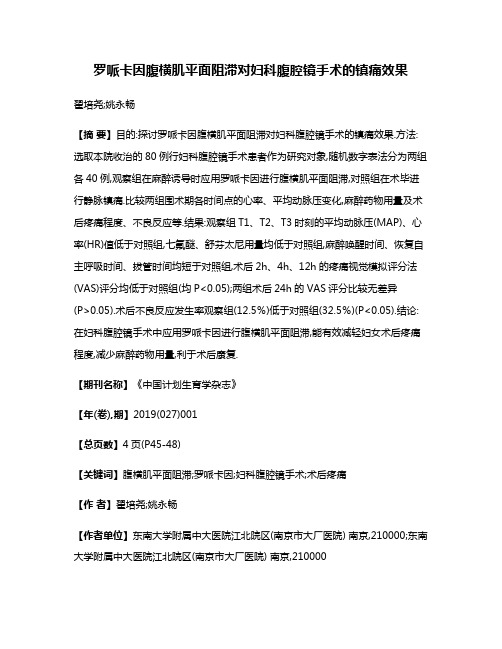
罗哌卡因腹横肌平面阻滞对妇科腹腔镜手术的镇痛效果翟培尧;姚永畅【摘要】目的:探讨罗哌卡因腹横肌平面阻滞对妇科腹腔镜手术的镇痛效果.方法:选取本院收治的80例行妇科腹腔镜手术患者作为研究对象,随机数字表法分为两组各40例,观察组在麻醉诱导时应用罗哌卡因进行腹横肌平面阻滞,对照组在术毕进行静脉镇痛.比较两组围术期各时间点的心率、平均动脉压变化,麻醉药物用量及术后疼痛程度、不良反应等.结果:观察组T1、T2、T3时刻的平均动脉压(MAP)、心率(HR)值低于对照组,七氟醚、舒芬太尼用量均低于对照组,麻醉唤醒时间、恢复自主呼吸时间、拔管时间均短于对照组,术后2h、4h、12h的疼痛视觉模拟评分法(VAS)评分均低于对照组(均P<0.05);两组术后24h的VAS评分比较无差异(P>0.05).术后不良反应发生率观察组(12.5%)低于对照组(32.5%)(P<0.05).结论:在妇科腹腔镜手术中应用罗哌卡因进行腹横肌平面阻滞,能有效减轻妇女术后疼痛程度,减少麻醉药物用量,利于术后康复.【期刊名称】《中国计划生育学杂志》【年(卷),期】2019(027)001【总页数】4页(P45-48)【关键词】腹横肌平面阻滞;罗哌卡因;妇科腹腔镜手术;术后疼痛【作者】翟培尧;姚永畅【作者单位】东南大学附属中大医院江北院区(南京市大厂医院) 南京,210000;东南大学附属中大医院江北院区(南京市大厂医院) 南京,210000【正文语种】中文妇科腹腔镜手术以其创伤小、并发症少、术后恢复快等优点得到了临床认可。
但腹腔镜术后,患者仍不可避免存在疼痛,少数患者疼痛甚至达到无法忍受程度[1]。
静脉自控镇痛是妇科腹腔镜术后常用的镇痛手段,效果较好,但由于静脉给药,易引起多种不良反应[2]。
外周神经阻滞技术近年来发展势头迅猛,再加上超声引导、神经刺激等技术进步,在疼痛、麻醉中的应用也越来越广泛。
腹横肌平面阻滞是一种区域阻滞手段,可有效减轻腹部切口的疼痛程度[3]。
右美托咪定复合罗哌卡因腹横肌平面阻滞对腹腔镜手术加速康复妇科患者应激反应的影响
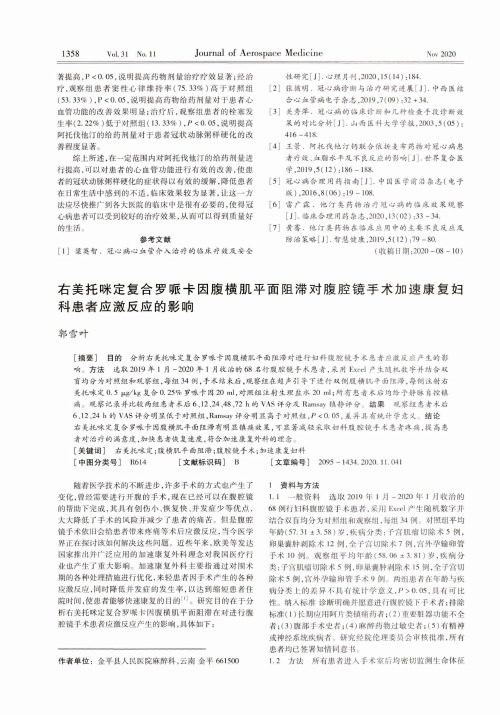
1358V 〇1.31 No . 11Journal of Aerospace MedicineNov 2020著提高,P <〇.〇5,说明提高药物剂量治疗疗效显著;经治疗,观察组患者窦性心律维持率(75. 33% )高于对照组(53. 33%), P < 0.05,说明提高药物给药剂量对于患者心血管功能的改善效果明显;治疗后,观察组患者的栓塞发生率(2. 22% )低于对照组(13. 33% ), P < 0. 05,说明提高阿托伐他汀的给药剂量对于患者冠状动脉粥样硬化的改善程度显著。
综上所述,在一定范围内对阿托伐他汀的给药剂量进行提高,可以对患者的心血管功能进行有效的改善,使患者的冠状动脉粥样硬化的症状得以有效的缓解,降低患者在日常生活中感到的不适,临床效果较为显著,让这一方法应尽快推广到各大医院的临床中是很有必要的,使得冠心病患者可以受到较好的治疗效果,从而可以得到质量好的生活。
参考文献[1]梁英智.冠心病心血管介入治疗的临床疗效及安全性研究[J ].心理月刊,2020,15(14): 184.[2] 张循明.冠心病诊断与治疗研究进展[J ].中西医结 合心血管病电子杂志,2019,7(09) :32 + 34.[3] 关秀萍.冠心病的临床诊断和几种检查手段诊断效 果的对比分析[J ].山西医科大学学报,2003,5(05): 416-418.[4] 王景.阿托伐他汀钙联合依折麦布药物对冠心病患 者疗效、血脂水平及不良反应的影响[J].世界复合医 #,2019,5(12) :186- 188.[5] 冠心病合理用药指南[J].中国医学前沿杂志(电子 版),2016,8(06) :19 -108.[6] 雷广霖.他汀类药物治疗冠心病的临床效果观察 [J]•临床合理用药杂志,2020,13(02) :33 - 34.[7] 黄骞.他汀类药物在临床应用中的主要不良反应及 防治策略[J ] •智慧健康,2019,5 (1 _2):79 - 80.(收稿日期:2020-08-10)右美托咪定复合罗脈卡因腹横肌平面阻滞对腹腔镜手术加速康复妇 科患者应激反应的影响郭雪叶[摘要]目的分析右美托咪定复合罗哌卡因腹橫肌平面阻滞对进行妇科腹腔镜手术患者应激反应产生的影 响。
腹腔镜手术患者术后镇痛策略及充分镇痛的作用

腹腔镜手术患者术后镇痛策略及充分镇痛的作用【摘要】目的:探讨腹腔镜手术患者术后采取不同镇痛策略的镇痛效果,为临床治疗提供参考依据。
方法:随机将2018年9月至2021年9月采取腹腔镜手术治疗的120例患者分为两组,各60例。
其中,两组术前均采取买醉诱导,研究组静脉泵注右美托咪定,参照组静脉泵注等量生理盐水,术后采取自控静脉镇痛策略(PCIA),参照组采用布托啡诺镇痛,研究组在此基础上联合右美托咪定镇痛,对比两组镇痛效果。
结果:两组术后T1静息、活动时疼痛程度(VAS评分)、术后瘙痒、谵妄、心动过缓等不良反应发生率对比差异无统计学意义(P>0.05),研究组T2~T4静息与活动时VAS评分、眩晕、恶心呕吐发生率均低于参照组,差异有统计学意义(P<0.05)。
结论:腹腔镜手术患者采取右美托咪定复合布托啡诺镇痛的策略,对患者能起到充分镇痛的作用,且不良反应较少,治疗安全性更高,适合在临床上应用。
【关键词】腹腔镜手术;术后镇痛策略;充分镇痛;不良反应腹腔镜手术在临床上属于微创手术,具有手术切口小,出血量少,术后伤口愈合快等优点,有助于患者术后恢复,缩短患者的住院时间[1]。
但是,部分腹腔镜手术患者术后存在伤口疼痛的问题,对其术后的康复与预后不利。
因此,为了改善腹腔镜手术患者的疼痛程度,选择安全、合理的术后镇痛策略,对患者来言极为重要。
目前,临床上常用的镇痛药物主要为阿片类药物,右美托咪定属于肾上腺素能受体激动剂,有镇痛镇静、抗焦虑等效果[2]。
本次研究以腹腔镜手术患者为观察对象,给予患者不同的镇痛措施,分析术后镇痛的作用及效果,详细研究内容,汇报如下。
1资料与方法1.1一般资料选取2018年9月—2021年9月收治的120例腹腔镜手术患者按照随机原则进行分组,每组60例。
参照组34例男,26例女,年龄46~68岁(54.67±5.38)岁,体重指数20~26(23.07±2.24)kg/m2;研究组32例男,28例女,年龄47~70岁(55.12±5.29)岁,体重指数20~25(22.84±2.19)kg/m2。
观察罗哌卡因腹横肌平面阻滞对妇科腹腔镜手术的镇痛效果
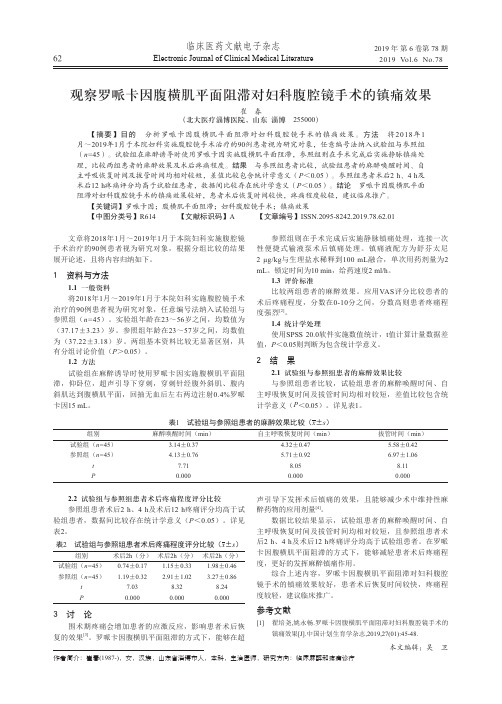
临床医药文献电子杂志Electronic Journal of Clinical Medical Literature 2019 年第 6 卷第 78 期2019 Vol.6 No.7862观察罗哌卡因腹横肌平面阻滞对妇科腹腔镜手术的镇痛效果崔春(北大医疗淄博医院,山东淄博 255000)【摘要】目的 分析罗哌卡因腹横肌平面阻滞对妇科腹腔镜手术的镇痛效果。
方法 将2018年1月~2019年1月于本院妇科实施腹腔镜手术治疗的90例患者视为研究对象,任意编号法纳入试验组与参照组(n=45)。
试验组在麻醉诱导时使用罗哌卡因实施腹横肌平面阻滞,参照组则在手术完成后实施静脉镇痛处理,比较两组患者的麻醉效果及术后疼痛程度。
结果 与参照组患者比较,试验组患者的麻醉唤醒时间、自主呼吸恢复时间及拔管时间均相对较短,差值比较包含统计学意义(P<0.05)。
参照组患者术后2 h、4 h及术后12 h疼痛评分均高于试验组患者,数据间比较存在统计学意义(P<0.05)。
结论 罗哌卡因腹横肌平面阻滞对妇科腹腔镜手术的镇痛效果较好,患者术后恢复时间较快,疼痛程度较轻,建议临床推广。
【关键词】罗哌卡因;腹横肌平面阻滞;妇科腹腔镜手术;镇痛效果【中图分类号】R614 【文献标识码】A 【文章编号】ISSN.2095-8242.2019.78.62.01文章将2018年1月~2019年1月于本院妇科实施腹腔镜手术治疗的90例患者视为研究对象,根据分组比较的结果展开论述,且将内容归纳如下。
1 资料与方法1.1 一般资料将2018年1月~2019年1月于本院妇科实施腹腔镜手术治疗的90例患者视为研究对象,任意编号法纳入试验组与参照组(n=45)。
实验组年龄在23~56岁之间,均数值为(37.17±3.23)岁。
参照组年龄在23~57岁之间,均数值为(37.22±3.18)岁。
两组基本资料比较无显著区别,具有分组讨论价值(P>0.05)。
罗哌卡因复合小剂量右美托咪定超声引导下腹横肌平面阻滞对于预防妇科腹腔镜手术后疼痛的作用分析
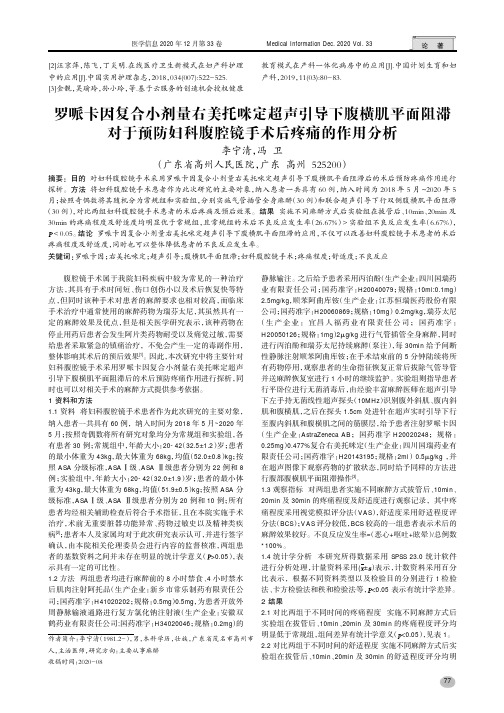
腹腔镜手术属于我院妇科疾病中较为常见的一种治疗 静脉输注。之后给予患者采用丙泊酚(生产企业:四川国瑞药
教育模式在产科一体化病房中的应用[J].中国计划生育和妇 产科,2019,11(03):80-83.
罗哌卡因复合小剂量右美托咪定超声引导下腹横肌平面阻滞 对于预防妇科腹腔镜手术后疼痛的作用分析
李宁清,冯 卫 (广东省高州人民医院,广东 高州 525200)
摘要: 目的 对妇科腹腔镜手术采用罗哌卡因复合小剂量右美托咪定超声引导下腹横肌平面阻滞后的术后预防疼痛作用进行 探析。方法 将妇科腹腔镜手术患者作为此次研究的主要对象,纳入患者一共具有 60 例,纳入时间为 2018 年 5 月 ~2020 年 5 月;按照奇偶数将其随机分为常规组和实验组,分别实施气管插管全身麻醉(30 例)和联合超声引导下行双侧腹横肌平面阻滞 (30 例),对比两组妇科腹腔镜手术患者的术后疼痛及预后效果。结果 实施不同麻醉方式后实验组在拔管后、10min、20min 及 30min 的疼痛程度及舒适度均明显优于常规组,且常规组的术后不良反应发生率(26.67%)>实验组不良反应发生率(6.67%),
定的麻醉效果及优点,但是相关医学研究表示,该种药物在 (生 产 企 业 : 宜 昌 人 福 药 业 有 限 责 任 公 司 ; 国 药 准 字 :
停止用药后患者会发生阿片类药物耐受以及痛觉过敏,需要 H20050126;规格:1mg)2μg/kg 进行气管插管全身麻醉,同时
罗哌卡因复合右美托咪定行腹横肌平面阻滞用于腹腔镜下子宫全切术后镇痛效果评价

子宫全切术作为妇科常见手术,主要应用于子宫肿瘤、子宫疾病保守治疗无效等妇科疾病治疗中,其中腹腔镜下子宫全切术应用广泛,具有创伤小、安全性高的优势[1]。
腹腔镜下子宫全切术主要采取全身麻醉,保证术中麻醉效果好,维持通畅的呼吸,利于手术顺利展开,但因无阻滞伤害性刺激效果,导致术后疼痛明显。
腹横肌平面阻滞(TAPB)可通过麻醉药物阻滞腹横肌的支配神经起到镇痛效果,而单纯应用罗哌卡因虽然延长镇痛时间,但存在起效时间长、药物过量易引起不良反应等弊端,影响镇痛效果及术后恢复[2]。
右美托咪定作为增强外周神经阻滞局麻药物的作用,可联合罗哌卡因提高镇痛效果[3]。
为此,本研究对腹腔镜下子宫全切术TAPB 中应用罗哌卡因复合右美托咪定对术后镇痛效果的影响进行了探讨,具体报告如下。
【摘要】 目的 探讨腹腔镜下子宫全切术腹横肌平面阻滞(TAPB)中应用罗哌卡因复合右美托咪定对术后镇痛效果的影响。
方法 将2020年8月- 2022年8月医院收治的90例腹腔镜下子宫全切术患者纳入研究,根据组间年龄、体重、疾病类型等基线资料均衡可比的原则分为两组,每组45例。
两组患者均采取TAPB,其中对照组应用罗哌卡因,观察组应用罗哌卡因复合右美托咪定。
比较两组患者术后疼痛程度、恢复情况及不良反应发生率。
结果 术后2、6、12h,观察组静息状态和活动状态疼痛程度评分显著低于对照组,差异有统计学意义(P <0.05);术后24h 两组患者静息状态和活动状态疼痛程度评分比较,差异无统计学意义(P >0.05)。
观察组首次按压镇痛泵时间显著长于对照组,观察组48h 按压镇痛泵次数、自控静脉镇痛(PCIA)输注总量、下床时间显著低于对照组,差异有统计学意义(P <0.05)。
观察组不良反应发生率为13.33%,显著低于对照组的33.33%,差异有统计学意义(P <0.05)。
结论 腹腔镜下子宫全切术TAPB 患者采取罗哌卡因复合右美托咪定可进一步提高术后镇痛效果,利于术后快速恢复,尽早下床活动,而且可减少不良反应。
右美托咪定复合罗哌卡因行腹横肌平面阻滞对开腹手术术后疼痛及炎症反应的影响

右美托咪定复合罗哌卡因行腹横肌平面阻滞对开腹手术术后疼痛及炎症反应的影响蒋 珏,黄 燕(上海交通大学医学院附属第九人民医院,上海200011) [摘要]评价右美托咪定复合罗哌卡因行腹横肌平面阻滞对开腹手术术后疼痛及炎症反应的影响。
选择2016年6月—2019年5月在上海交通大学医学院附属第九人民医院择期行开腹手术的患者60例,采用随机数字表法将患者分为3组:右美托咪定复合罗哌卡因组给予右美托咪定0.125μg /kg 复合0.25%罗哌卡因30mL 行腹横肌平面神经阻滞,罗哌卡因组给予0.25%罗哌卡因30mL 行腹横肌平面神经阻滞,生理盐水组给予生理盐水30mL 腹横肌平面注射。
记录入室时、切皮时、苏醒结束时3个时间点患者的心率和平均动脉压,苏醒结束时、术后24h 的VAS 评分,术后首次吗啡使用时间、术后48h 内吗啡使用量。
入室时、术毕、术后24h组患者静脉血5mL ,检测血清肿瘤坏死因子-α(TNF -α)和白细胞介素-6(IL -6)水平。
最终56例患者完成所有研究。
切皮时、苏醒结束时,美托咪定复合罗哌卡因组和罗哌卡因组(P 均<0.05)。
右美托咪定复合罗哌卡因组和罗哌卡因组VAS 评分和吗啡使用量均显著低于生理盐水组(P 均<0.05),且吗啡初次使用时间明显晚于生理盐水组(P 均<0.05)。
术毕和术后24h 时,右美托咪定复合罗哌卡因组的TNF -α和IL -6水平均显著低于生理盐水组和罗哌卡因组(P 均<0.05)。
右美托咪定复合罗哌卡因行腹横肌平面神经阻滞可安全有效的减轻开腹手术患者术后疼痛及全身炎症反应,减少术后吗啡使用量。
[关键词] 腹横肌平面阻滞;右美托咪定;罗哌卡因;镇痛;炎症doi :10.3969/j.issn.1008-8849.2020.11.022[中图分类号] R614.2 [文献标识码] B [文章编号] 1008-8849(2020)11-1228-04 外科开腹手术是临床常见手术类型,是胃肠肿瘤、肝胆疾病的常规治疗方法,而术后疼痛和炎症反应不利于患者的康复,甚至诱发相关并发症[1],因此良好的术后镇痛显得尤为重要,也是践行快速康复外科理念的要求。
超声引导腹横肌平面阻滞对妇科腹腔镜手术后镇痛的影响观察

超声引导腹横肌平面阻滞对妇科腹腔镜手术后镇痛的影响观察摘要】目的:探究超声引导腹横肌平面阻滞对妇科腹腔镜手术后镇痛的影响。
方法:以我院2017年3月—2018年3月期间住院治疗的162例妇科腹腔镜手术患者为观察对象,以随机数字表法将其分为对照组(81例)、研究组(81例)。
所有患者术中均采用常规全麻,术后给予静脉镇痛泵治疗。
对照组于患者苏醒期给予等量生理盐水输注,研究组则给予超声引导腹横肌平面阻滞,观察对比组间镇痛效果及术后镇痛泵按压次数差异。
结果:研究组术后4h镇痛泵按压次数、VAS评分分别为(0.7±0.1)次、(2.7±0.3)分,数值均小于对照组,存在统计学差异(P<0.05)。
两组患者术后8hVAS评分及镇痛泵按压次数相比,无统计学差异(P>0.05)。
结论:超声引导腹横肌平面阻滞对妇科腹腔镜手术后患者镇痛效果甚佳,可减少术后镇痛泵使用次数。
【关键词】超声引导;腹横肌平面阻滞;妇科腹腔镜手术;镇痛【中图分类号】R445 【文献标识码】A 【文章编号】1007-8231(2018)22-0131-02近年来随着妇科腹腔镜的推广使用,其取得了良好的反馈。
腹腔镜手术具有创伤小、恢复快等特点,受到了广大患者的喜爱。
但是通过腹腔镜手术治疗,术后疼痛感较为强烈。
因此,选择安全有效的阵痛方式非常重要。
腹横肌平面组织作为局麻的一种,其可通过体表定位和穿刺将麻醉药物注入腹部肌肉中的神经血管层内。
从而有效阻断感觉神经,起到止痛的作用。
国外学者针对这一技术开展了广泛的探讨,取得了良好的效果。
故本文选取81例妇科腹腔镜手术患者,对其进行,取得了良好的效果,现报道如下。
1.资料与方法1.1 一般资料纳入162例妇科腹腔镜手术患者,选自我院2017年3月—2018年3月间。
通过随机数字表法分为以下两组,即对照组81例,研究组81例。
对照组年龄29~45(35.3±10.1)岁,研究组年龄28~46(35.1±10.3)岁。
腹横肌平面阻滞复合全麻对妇科腹腔镜手术患者术后早期恢复和镇痛的影响
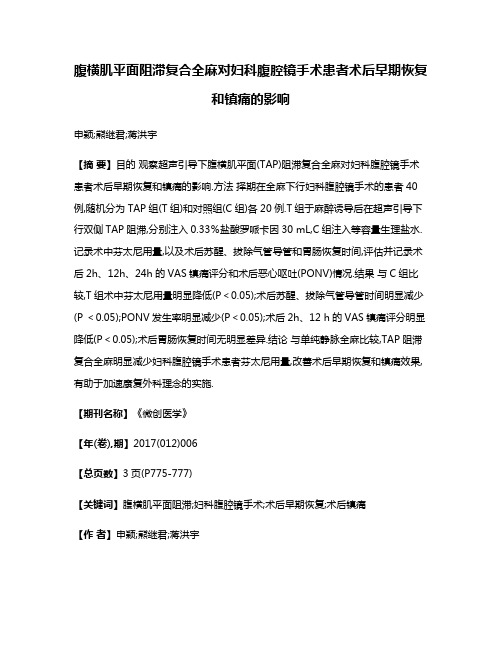
腹横肌平面阻滞复合全麻对妇科腹腔镜手术患者术后早期恢复和镇痛的影响申颖;熊继君;蒋洪宇【摘要】目的观察超声引导下腹横肌平面(TAP)阻滞复合全麻对妇科腹腔镜手术患者术后早期恢复和镇痛的影响.方法择期在全麻下行妇科腹腔镜手术的患者40例,随机分为TAP组(T组)和对照组(C组)各20例.T组于麻醉诱导后在超声引导下行双侧TAP阻滞,分别注入0.33%盐酸罗哌卡因30 mL,C组注入等容量生理盐水.记录术中芬太尼用量,以及术后苏醒、拔除气管导管和胃肠恢复时间,评估并记录术后2h、12h、24h的VAS镇痛评分和术后恶心呕吐(PONV)情况.结果与C组比较,T组术中芬太尼用量明显降低(P<0.05);术后苏醒、拔除气管导管时间明显减少(P <0.05);PONV发生率明显减少(P<0.05);术后2h、12 h的VAS镇痛评分明显降低(P<0.05);术后胃肠恢复时间无明显差异.结论与单纯静脉全麻比较,TAP阻滞复合全麻明显减少妇科腹腔镜手术患者芬太尼用量,改善术后早期恢复和镇痛效果,有助于加速康复外科理念的实施.【期刊名称】《微创医学》【年(卷),期】2017(012)006【总页数】3页(P775-777)【关键词】腹横肌平面阻滞;妇科腹腔镜手术;术后早期恢复;术后镇痛【作者】申颖;熊继君;蒋洪宇【作者单位】广西桂林市人民医院妇产科,桂林市541002;广西桂林市人民医院麻醉科,桂林市541002;广西桂林市人民医院麻醉科,桂林市541002【正文语种】中文【中图分类】R713.1近年来,加速康复外科理念被越来越多的临床医师接受,在妇科手术中引入加速康复外科理念,最大程度减少围术期应激反应,加速患者术后康复进程,降低并发症发生率是值得关注的研究方向。
随着超声引导可视化技术的开展,腹横肌平面(transversus abdominis plane,TAP)阻滞的成功率和安全性明显提高。
笔者在妇科腹腔镜手术患者中使用TAP阻滞复合全麻与单纯静脉全麻比较,评价其对患者术后早期恢复和镇痛的影响,为临床加速康复外科理念的应用提供参考,报告如下。
罗哌卡因复合低剂量的布托啡诺不同时机局部浸润用于腹腔镜子宫肌瘤剔除术后镇痛的临床效果研究
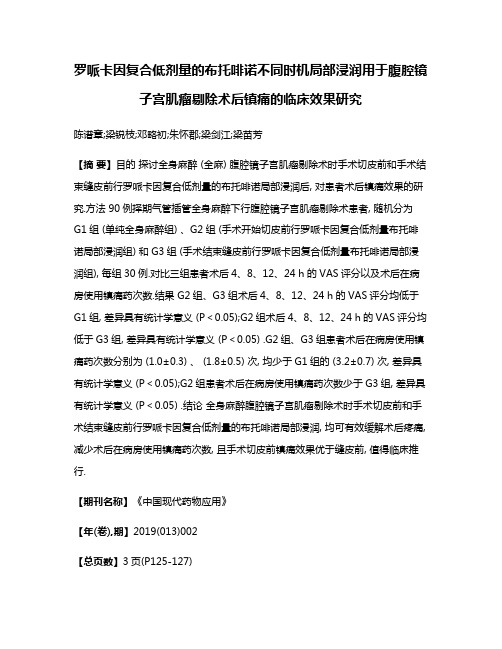
罗哌卡因复合低剂量的布托啡诺不同时机局部浸润用于腹腔镜子宫肌瘤剔除术后镇痛的临床效果研究陈谱章;梁锐枝;邓略初;朱怀郡;梁剑江;梁苗芳【摘要】目的探讨全身麻醉 (全麻) 腹腔镜子宫肌瘤剔除术时手术切皮前和手术结束缝皮前行罗哌卡因复合低剂量的布托啡诺局部浸润后, 对患者术后镇痛效果的研究.方法 90例择期气管插管全身麻醉下行腹腔镜子宫肌瘤剔除术患者, 随机分为G1组 (单纯全身麻醉组) 、G2组 (手术开始切皮前行罗哌卡因复合低剂量布托啡诺局部浸润组) 和G3组 (手术结束缝皮前行罗哌卡因复合低剂量布托啡诺局部浸润组), 每组30例.对比三组患者术后4、8、12、24 h的VAS评分以及术后在病房使用镇痛药次数.结果 G2组、G3组术后4、8、12、24 h的VAS评分均低于G1组, 差异具有统计学意义 (P<0.05);G2组术后4、8、12、24 h的VAS评分均低于G3组, 差异具有统计学意义 (P<0.05) .G2组、G3组患者术后在病房使用镇痛药次数分别为(1.0±0.3) 、(1.8±0.5) 次, 均少于G1组的(3.2±0.7) 次, 差异具有统计学意义 (P<0.05);G2组患者术后在病房使用镇痛药次数少于G3组, 差异具有统计学意义 (P<0.05) .结论全身麻醉腹腔镜子宫肌瘤剔除术时手术切皮前和手术结束缝皮前行罗哌卡因复合低剂量的布托啡诺局部浸润, 均可有效缓解术后疼痛, 减少术后在病房使用镇痛药次数, 且手术切皮前镇痛效果优于缝皮前, 值得临床推行.【期刊名称】《中国现代药物应用》【年(卷),期】2019(013)002【总页数】3页(P125-127)【关键词】罗哌卡因;局部浸润;术后镇痛【作者】陈谱章;梁锐枝;邓略初;朱怀郡;梁剑江;梁苗芳【作者单位】广东省中山市黄圃人民医院 528429;广东省中山市黄圃人民医院528429;广东省中山市黄圃人民医院 528429;广东省中山市黄圃人民医院 528429;广东省中山市黄圃人民医院 528429;广东省中山市黄圃人民医院 528429【正文语种】中文随着舒适医疗的快速发展以及腹腔镜手术日渐增多, 针对腹腔镜手术术后疼痛的研究价值也相对提高。
罗哌卡因复合小剂量右美托咪定TAP阻滞预防妇科腹腔镜手术后疼痛的临床观察
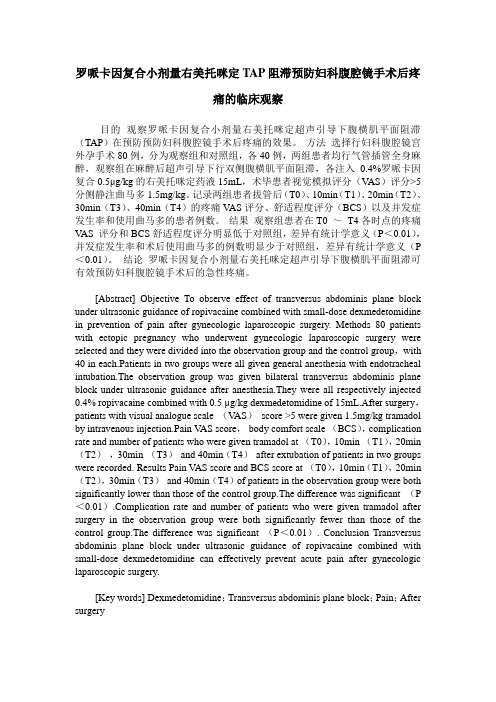
罗哌卡因复合小剂量右美托咪定TAP阻滞预防妇科腹腔镜手术后疼痛的临床观察目的观察罗哌卡因复合小剂量右美托咪定超声引导下腹横肌平面阻滞(TAP)在预防预防妇科腹腔镜手术后疼痛的效果。
方法选择行妇科腹腔镜宫外孕手术80例,分为观察组和对照组,各40例,两组患者均行气管插管全身麻醉,观察组在麻醉后超声引导下行双侧腹横肌平面阻滞,各注入0.4%罗哌卡因复合0.5μg/kg的右美托咪定药液15mL,术毕患者视觉模拟评分(V AS)评分>5分侧静注曲马多1.5mg/kg。
记录两组患者拔管后(T0)、10min(T1)、20min(T2)、30min(T3)、40min(T4)的疼痛V AS评分、舒适程度评分(BCS)以及并发症发生率和使用曲马多的患者例数。
结果观察组患者在T0 ~T4各时点的疼痛V AS 评分和BCS舒适程度评分明显低于对照组,差异有统计学意义(P<0.01),并发症发生率和术后使用曲马多的例数明显少于对照组,差异有统计学意义(P <0.01)。
结论罗哌卡因复合小剂量右美托咪定超声引导下腹横肌平面阻滞可有效预防妇科腹腔镜手术后的急性疼痛。
[Abstract] Objective To observe effect of transversus abdominis plane block under ultrasonic guidance of ropivacaine combined with small-dose dexmedetomidine in prevention of pain after gynecologic laparoscopic surgery. Methods 80 patients with ectopic pregnancy who underwent gynecologic laparoscopic surgery were selected and they were divided into the observation group and the control group,with 40 in each.Patients in two groups were all given general anesthesia with endotracheal intubation.The observation group was given bilateral transversus abdominis plane block under ultrasonic guidance after anesthesia.They were all respectively injected 0.4% ropivacaine combined with 0.5 μg/kg dexmedetomidine of 15mL.After surgery,patients with visual analogue scale (V AS)score >5 were given 1.5mg/kg tramadol by intravenous injection.Pain V AS score,body comfort scale (BCS),complication rate and number of patients who were given tramadol at (T0),10min (T1),20min (T2),30min (T3)and 40min(T4)after extubation of patients in two groups were recorded. Results Pain V AS score and BCS score at (T0),10min(T1),20min (T2),30min(T3)and 40min(T4)of patients in the observation group were both significantly lower than those of the control group.The difference was significant (P <0.01).Complication rate and number of patients who were given tramadol after surgery in the observation group were both significantly fewer than those of the control group.The difference was significant (P<0.01). Conclusion Transversus abdominis plane block under ultrasonic guidance of ropivacaine combined with small-dose dexmedetomidine can effectively prevent acute pain after gynecologic laparoscopic surgery.[Key words] Dexmedetomidine;Transversus abdominis plane block;Pain;After surgery婦科腹腔镜宫外孕手术具有创伤小、手术时间短、患者年轻和恢复快的特点,因而要求麻醉使用效果好、代谢快的麻醉药,瑞芬太尼是一种超短效阿片μ受体激动剂,具有起效迅速,镇痛效果好,消除快,长时间大剂量使用体内无蓄积等特点,特别适合在腹腔镜宫外孕手术麻醉中使用,但是瑞芬太尼停止用药后发生阿片类药物耐受以及痛觉过敏,痛觉过敏的发生率高达16.1%[1],使用帕瑞昔布钠、曲马多、布托啡诺、地佐辛、舒芬太尼等可以预防瑞芬太尼麻醉后所急性疼痛[2-5],但这些镇痛药会对患者产生不良反应,本文使用罗哌卡因复合小剂量右美托咪定超声引导下腹横肌平面阻滞(TAP)预防妇科腹腔镜手术后急性疼痛进行了临床观察,现报道如下。
罗哌卡因复合布托啡诺腹横肌平面阻滞麻醉对腹腔镜腹部手术患者应激反应及麻醉效果的影响
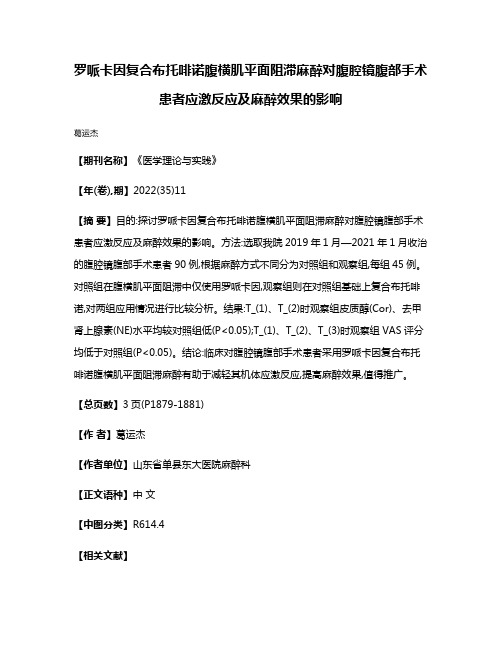
罗哌卡因复合布托啡诺腹横肌平面阻滞麻醉对腹腔镜腹部手术患者应激反应及麻醉效果的影响
葛运杰
【期刊名称】《医学理论与实践》
【年(卷),期】2022(35)11
【摘要】目的:探讨罗哌卡因复合布托啡诺腹横肌平面阻滞麻醉对腹腔镜腹部手术患者应激反应及麻醉效果的影响。
方法:选取我院2019年1月—2021年1月收治的腹腔镜腹部手术患者90例,根据麻醉方式不同分为对照组和观察组,每组45例。
对照组在腹横肌平面阻滞中仅使用罗哌卡因,观察组则在对照组基础上复合布托啡诺,对两组应用情况进行比较分析。
结果:T_(1)、T_(2)时观察组皮质醇(Cor)、去甲肾上腺素(NE)水平均较对照组低(P<0.05);T_(1)、T_(2)、T_(3)时观察组VAS评分均低于对照组(P<0.05)。
结论:临床对腹腔镜腹部手术患者采用罗哌卡因复合布托啡诺腹横肌平面阻滞麻醉有助于减轻其机体应激反应,提高麻醉效果,值得推广。
【总页数】3页(P1879-1881)
【作者】葛运杰
【作者单位】山东省单县东大医院麻醉科
【正文语种】中文
【中图分类】R614.4
【相关文献】
1.罗哌卡因复合布托啡诺腹横肌平面阻滞对妇科腹腔镜手术患者术后镇痛及早期康复的影响
2.肋缘下腹横肌平面阻滞麻醉中三种浓度罗哌卡因对行上腹部手术患者麻醉效果的影响
3.右美托咪定复合罗哌卡因腹横肌平面阻滞对腹腔镜手术加速康复妇科患者应激反应的影响
4.右美托咪定复合罗哌卡因腹横肌平面阻滞对腹腔镜手术加速康复妇科患者应激反应的影响
5.超声引导下腹横肌筋膜平面阻滞联合全身麻醉对腹腔镜手术患者镇痛效果及应激反应的影响
因版权原因,仅展示原文概要,查看原文内容请购买。
罗哌卡因复合地佐辛行腹横肌平面阻滞对剖宫产术后镇痛的影响
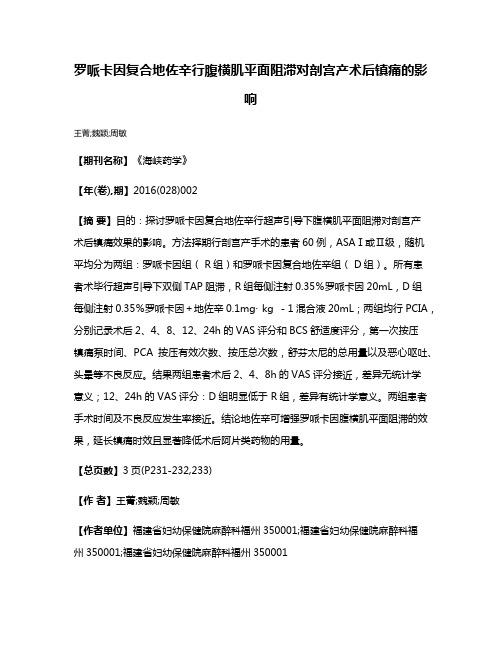
罗哌卡因复合地佐辛行腹横肌平面阻滞对剖宫产术后镇痛的影响王菁;魏颖;周敏【期刊名称】《海峡药学》【年(卷),期】2016(028)002【摘要】目的:探讨罗哌卡因复合地佐辛行超声引导下腹横肌平面阻滞对剖宫产术后镇痛效果的影响。
方法择期行剖宫产手术的患者60例,ASAⅠ或Ⅱ级,随机平均分为两组:罗哌卡因组( R组)和罗哌卡因复合地佐辛组( D组)。
所有患者术毕行超声引导下双侧TAP阻滞,R组每侧注射0.35%罗哌卡因20mL,D组每侧注射0.35%罗哌卡因+地佐辛0.1mg· kg -1混合液20mL;两组均行PCIA,分别记录术后2、4、8、12、24h的VAS评分和BCS舒适度评分,第一次按压镇痛泵时间、PCA按压有效次数、按压总次数,舒芬太尼的总用量以及恶心呕吐、头晕等不良反应。
结果两组患者术后2、4、8h的VAS评分接近,差异无统计学意义;12、24h的 VAS评分:D组明显低于 R组,差异有统计学意义。
两组患者手术时间及不良反应发生率接近。
结论地佐辛可增强罗哌卡因腹横肌平面阻滞的效果,延长镇痛时效且显著降低术后阿片类药物的用量。
【总页数】3页(P231-232,233)【作者】王菁;魏颖;周敏【作者单位】福建省妇幼保健院麻醉科福州350001;福建省妇幼保健院麻醉科福州350001;福建省妇幼保健院麻醉科福州350001【正文语种】中文【中图分类】R969.4【相关文献】1.右美托咪定复合罗哌卡因行腹横肌平面阻滞对直肠癌术后快速康复的影响 [J], 王金保;张在旺;汤龙信;杨小民2.右美托咪定复合罗哌卡因行腹横肌平面阻滞对开腹手术术后疼痛及炎症反应的影响 [J], 蒋珏; 黄燕3.纳布啡复合罗哌卡因腹横肌平面阻滞强化剖宫产术后镇痛 [J], 韩苗华;牛居辉;易红;杨光;程戌春;童彬4.PCIA联合罗哌卡因复合右美托咪定行超声引导腹横肌平面阻滞用于剖宫产术后镇痛的效果 [J], 姜姗姗5.罗哌卡因复合右美托咪定腹横肌平面阻滞对剖宫产术后镇痛的效果探讨 [J], 郑海梅;陈秀梅;张秀因版权原因,仅展示原文概要,查看原文内容请购买。
罗哌卡因加右美托咪定腹横肌平面阻滞用于腹腔镜术后镇痛的效果研究
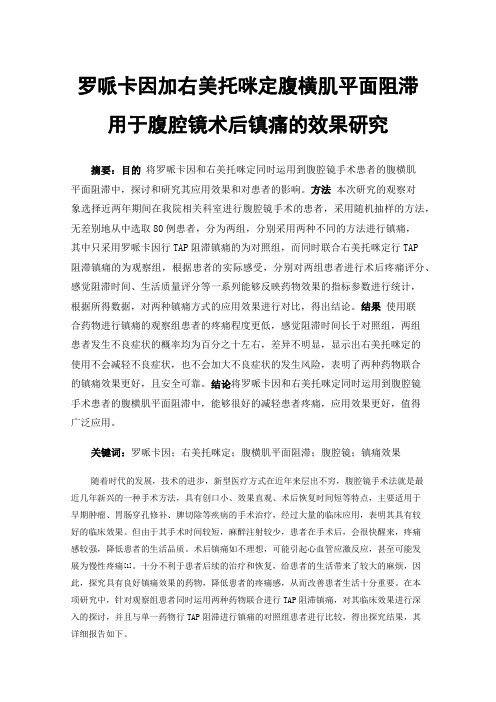
罗哌卡因加右美托咪定腹横肌平面阻滞用于腹腔镜术后镇痛的效果研究摘要:目的将罗哌卡因和右美托咪定同时运用到腹腔镜手术患者的腹横肌平面阻滞中,探讨和研究其应用效果和对患者的影响。
方法本次研究的观察对象选择近两年期间在我院相关科室进行腹腔镜手术的患者,采用随机抽样的方法,无差别地从中选取80例患者,分为两组,分别采用两种不同的方法进行镇痛,其中只采用罗哌卡因行TAP阻滞镇痛的为对照组,而同时联合右美托咪定行TAP阻滞镇痛的为观察组,根据患者的实际感受,分别对两组患者进行术后疼痛评分、感觉阻滞时间、生活质量评分等一系列能够反映药物效果的指标参数进行统计,根据所得数据,对两种镇痛方式的应用效果进行对比,得出结论。
结果使用联合药物进行镇痛的观察组患者的疼痛程度更低,感觉阻滞时间长于对照组,两组患者发生不良症状的概率均为百分之十左右,差异不明显,显示出右美托咪定的使用不会减轻不良症状,也不会加大不良症状的发生风险,表明了两种药物联合的镇痛效果更好,且安全可靠。
结论将罗哌卡因和右美托咪定同时运用到腹腔镜手术患者的腹横肌平面阻滞中,能够很好的减轻患者疼痛,应用效果更好,值得广泛应用。
关键词:罗哌卡因;右美托咪定;腹横肌平面阻滞;腹腔镜;镇痛效果随着时代的发展,技术的进步,新型医疗方式在近年来层出不穷,腹腔镜手术法就是最近几年新兴的一种手术方法,具有创口小、效果直观、术后恢复时间短等特点,主要适用于早期肿瘤、胃肠穿孔修补、脾切除等疾病的手术治疗,经过大量的临床应用,表明其具有较好的临床效果。
但由于其手术时间较短,麻醉注射较少,患者在手术后,会很快醒来,疼痛感较强,降低患者的生活品质。
术后镇痛如不理想,可能引起心血管应激反应,甚至可能发展为慢性疼痛[1]。
十分不利于患者后续的治疗和恢复,给患者的生活带来了较大的麻烦,因此,探究具有良好镇痛效果的药物,降低患者的疼痛感,从而改善患者生活十分重要。
在本项研究中,针对观察组患者同时运用两种药物联合进行TAP阻滞镇痛,对其临床效果进行深入的探讨,并且与单一药物行TAP阻滞进行镇痛的对照组患者进行比较,得出探究结果,其详细报告如下。
不同剂量右美托咪定复合罗哌卡因腹横肌平面阻滞用于腹腔镜手术术后镇痛的效果观察
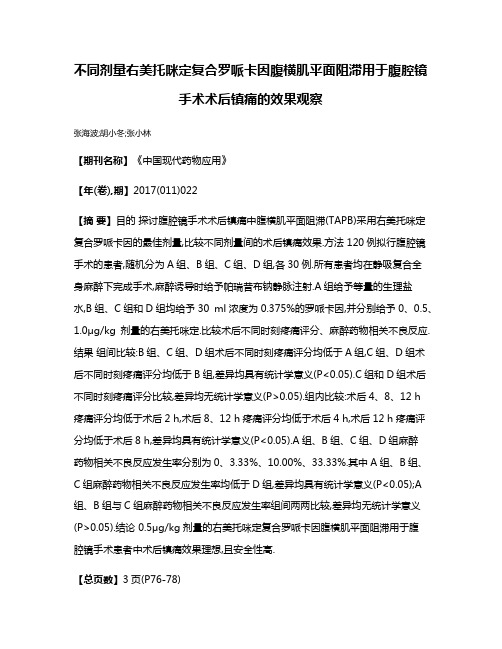
不同剂量右美托咪定复合罗哌卡因腹横肌平面阻滞用于腹腔镜手术术后镇痛的效果观察张海波;胡小冬;张小林【期刊名称】《中国现代药物应用》【年(卷),期】2017(011)022【摘要】目的探讨腹腔镜手术术后镇痛中腹横肌平面阻滞(TAPB)采用右美托咪定复合罗哌卡因的最佳剂量,比较不同剂量间的术后镇痛效果.方法 120例拟行腹腔镜手术的患者,随机分为A组、B组、C组、D组,各30例.所有患者均在静吸复合全身麻醉下完成手术,麻醉诱导时给予帕瑞昔布钠静脉注射.A组给予等量的生理盐水,B组、C组和D组均给予30 ml浓度为0.375%的罗哌卡因,并分别给予0、0.5、1.0μg/kg剂量的右美托咪定.比较术后不同时刻疼痛评分、麻醉药物相关不良反应.结果组间比较:B组、C组、D组术后不同时刻疼痛评分均低于A组,C组、D组术后不同时刻疼痛评分均低于B组,差异均具有统计学意义(P<0.05).C组和D组术后不同时刻疼痛评分比较,差异均无统计学意义(P>0.05).组内比较:术后4、8、12 h疼痛评分均低于术后2 h,术后8、12 h疼痛评分均低于术后4 h,术后12 h疼痛评分均低于术后8 h,差异均具有统计学意义(P<0.05).A组、B组、C组、D组麻醉药物相关不良反应发生率分别为0、3.33%、10.00%、33.33%.其中A组、B组、C组麻醉药物相关不良反应发生率均低于D组,差异均具有统计学意义(P<0.05);A 组、B组与C组麻醉药物相关不良反应发生率组间两两比较,差异均无统计学意义(P>0.05).结论 0.5μg/kg剂量的右美托咪定复合罗哌卡因腹横肌平面阻滞用于腹腔镜手术患者中术后镇痛效果理想,且安全性高.【总页数】3页(P76-78)【作者】张海波;胡小冬;张小林【作者单位】338000 新余市人民医院;338000 新余市人民医院;338000 新余市人民医院【正文语种】中文【相关文献】1.超声引导腹横肌平面盐酸右美托咪定复合罗哌卡因阻滞对腹腔镜下子宫次全切除术后镇痛效果观察 [J], 朱彬;施海滨;肖纯2.不同剂量右美托咪定联合罗哌卡因腹横肌平面阻滞用于腹腔镜卵巢切除术后镇痛的效果 [J], 陈宏博; 吴艳琴; 金资源; 李军3.右美托咪定联合罗哌卡因双侧腹横肌平面阻滞用于子宫腺肌症术后镇痛的效果观察 [J], 靳小永4.罗哌卡因复合不同剂量右美托咪定腹横肌平面阻滞对胃肠道腹腔镜手术患者镇痛及术后认知功能的影响 [J], 郭聪;杨昊5.罗哌卡因腹横肌平面阻滞复合右美托咪定用于腹腔镜直肠癌根治术后镇痛效果观察 [J], 肖木芬因版权原因,仅展示原文概要,查看原文内容请购买。
- 1、下载文档前请自行甄别文档内容的完整性,平台不提供额外的编辑、内容补充、找答案等附加服务。
- 2、"仅部分预览"的文档,不可在线预览部分如存在完整性等问题,可反馈申请退款(可完整预览的文档不适用该条件!)。
- 3、如文档侵犯您的权益,请联系客服反馈,我们会尽快为您处理(人工客服工作时间:9:00-18:30)。
罗哌卡因复合布托啡诺腹横肌平面阻滞对妇科腹腔镜患者术后镇痛及早期康复的影响目标:探究。
方法:选择连续行腹腔镜手术的60例妇科患者,随机分为观察组和比较组,各30例。
比较组仅行侵略性监测,观察组在术前应用罗哌卡因复合布托啡诺腹横肌平面阻滞。
比较两组患者手术后24小时内的视觉模拟评分(VAS)、镇痛药物使用量、通气恢复时间、康复时间和并发症发生率。
结果:观察组VAS评分、镇痛药物使用量、通气恢复时间、康复时间均显著优于比较组(P<0.05)。
观察组其中一例患者出现脑脊液渗漏并发症,比较组无并发症发生。
结论:罗哌卡因复合布托啡诺腹横肌平面阻滞可有效改善术后妇科腹腔镜手术患者的镇痛效果和早期康复,但需要注意并发症的风险。
关键词:罗哌卡因复合布托啡诺腹横肌平面阻滞;腹腔镜手术;妇科患者;术后镇痛;早期康复。
Abstract:Objective: To explore the effect of ropivacaine combined with bupivacaine transverse abdominal plane blockade on postoperative analgesia and early recovery in patients undergoing gynecological laparoscopy.Methods: Sixty gynecological patients undergoing consecutive laparoscopic surgery were randomly divided into an observation group and a control group, with 30 cases in each group. The control group only underwent invasive monitoring, while the observation group received ropivacaine combined with bupivacaine transverse abdominal plane blockade before surgery. The visual analogue scale (VAS) scores, analgesic use, recovery time, rehabilitation time, and complication rates were compared between the two groups within 24 hours after surgery.Results: The VAS scores, analgesic use, recovery time, and rehabilitation time were significantly better in the observation group than in the control group(P<0.05). One patient in the observation group developed cerebrospinal fluid leakage as a complication, while no complications were observed in the control group.Conclusion: Ropivacaine combined with bupivacainetransverse abdominal plane blockade can effectively improve postoperative analgesia and early recovery in patients undergoing gynecological laparoscopic surgery, but the risk of complications needs to be considered.Keywords: Ropivacaine combined with bupivacaine transverse abdominal plane blockade; Laparoscopic surgery; Gynecological patient; Postoperative analgesia; Early recovery。
In recent years, transverse abdominal plane (TAP) blockade has gained popularity as an effective technique for postoperative pain management inpatients undergoing gynecological laparoscopic surgery. The addition of ropivacaine to bupivacaine has been shown to have better analgesic efficacy compared to bupivacaine alone. Our study further confirms these findings and provides evidence-based recommendationsfor optimal pain management in this patient population.The mechanism of action of TAP blockade involves blocking the anterior and lateral cutaneous branchesof the intercostal nerves that supply the abdominal wall muscles. This results in effective analgesia without affecting motor function or causing systemic side effects. Our study showed that the addition of ropivacaine to bupivacaine TAP blockade resulted inlonger duration of analgesia, reduced opioid consumption, and improved patient satisfaction. Patients who received the combination blockade reported lesser pain intensity and fewer incidences of breakthrough pain during the first 24 hours postoperatively.The benefits of improved pain management extend beyond postoperative comfort. Effective pain control has been shown to facilitate early recovery, reduce the risk of postoperative ileus, and decrease the length of hospital stay. Our study observed that patients who received the combination TAP blockade were able to ambulate earlier, had better appetite, and reported lesser fatigue compared to the control group.Despite the significant advantages of TAP blockade, it is not without potential complications. Our study recorded minor complications such as transient paresthesia, hematoma, and wound infection in the study group. Therefore, careful patient selection, appropriate dose selection, and proper technique are essential to minimize the risk of adverse events.In conclusion, our study recommends the use of combined ropivacaine and bupivacaine TAP blockade for patients undergoing gynecological laparoscopic surgeryto improve postoperative analgesia, facilitate early recovery, and increase patient satisfaction. However,it is imperative that healthcare professionalscarefully evaluate the benefits and risks of this technique for each patient to avoid potential complications。
Furthermore, it should be noted that the dose and concentration of local anesthetics used in TAP blockade can vary among patients, based on factorssuch as body weight and comorbidities. Thus, individualized dosing and careful monitoring are essential to ensure optimal pain relief and minimize the risk of adverse effects.Moreover, patient education regarding TAP blockade and its potential benefits and limitations is crucial for improving patient satisfaction and compliance with postoperative care. Patients should be informed about the expected duration of pain relief, as well as any potential side effects or complications that may occur. Additionally, patients should be encouraged to report any adverse events, such as local anesthetic toxicity or nerve injury, to their healthcare provider immediately.Finally, it is important to recognize that TAPblockade is just one component of a multimodal pain management approach. Other strategies, such as nonsteroidal anti-inflammatory drugs (NSAIDs), acetaminophen, and opioids, may also be used to provide effective pain relief while minimizing opioid-related side effects. Therefore, healthcare professionals should consider individual patient factors and preferences when developing a comprehensive pain management plan.In conclusion, TAP blockade is a promising technique for improving postoperative pain relief, reducing opioid consumption, and enhancing recovery after gynecological laparoscopic surgery. However, careful patient selection, individualized dosing, and close monitoring are crucial to ensuring optimal outcomes and minimizing the risk of adverse events. Moreover, a multimodal approach to pain management should be considered to provide comprehensive pain relief and improve patient satisfaction. Therefore, healthcare professionals should be familiar with the benefits and limitations of TAP blockade and use it judiciously as part of a holistic pain management strategy。
